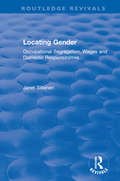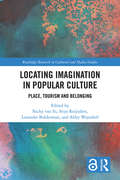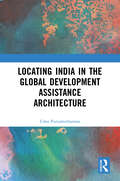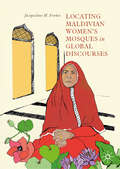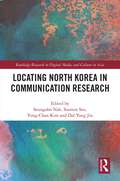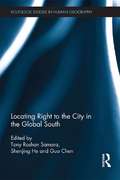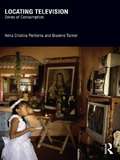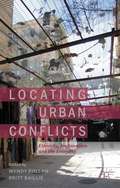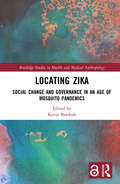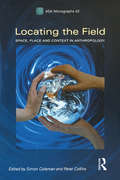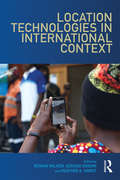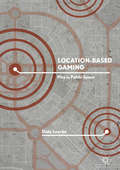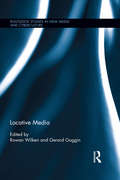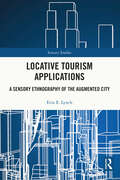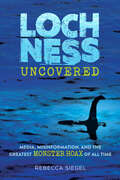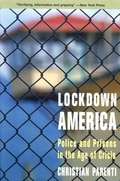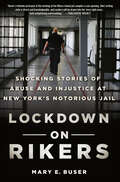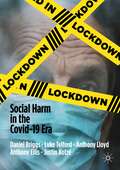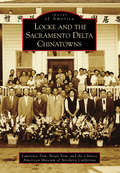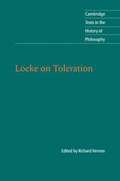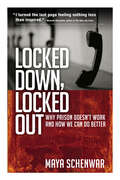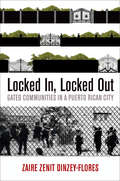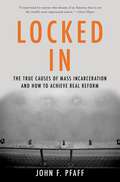- Table View
- List View
Locating Gender: Occupational Segregation, Wages and Domestic Responsibilities
by Janet SiltanenFirst published in 1994, Locating Gender combines a case-study approach with significant theoretical development to challenge explanations of occupational segregation. It examines the diversity of women’s employment experience, gender segregation within employment establishments, employment and domestic relations, and the place of gender in perceptions of inequality. The book develops the concepts of component-wage and full-wage jobs in the context of work histories and employment relations, and establishes their usefulness in the study of the social adequacy of wages. In doing so, it provides a close and critical examination of the power of gender as an explanatory concept in employment and domestic relations, including an in-depth analysis of the circumstances prior to, and following, changes to eliminate sex discrimination from official practices in a particular workplace. It will be of interest to students and researchers of gender studies, the sociology of work and social stratification, social policy, business studies, and labour economics.
Locating Heisei in Japanese Fiction and Film: The Historical Imagination of the Lost Decades (Routledge Contemporary Japan Series)
by Marc YamadaThis book provides the first interdisciplinary examination of the popular fiction and film of the “lost decades” of Japan’s Heisei period (1989–2019). Presenting original analysis of major Heisei writers, filmmakers, and manga artists, the chapters examine the work of Urasawa Naoki, Kurosawa Kiyoshi, Murakami Haruki, and Shinkai Makoto, among others. Through the work of these cultural figures, the book also explores the struggle to define the history of Heisei—three decades of economic stagnation, social malaise, and natural disaster. In particular, it explores the dissonance between the dominant history of Japan’s recent past and the representation of this past in the popular imagination of the period. In so doing, this book argues that traumatic events from the years leading up to Heisei complicate the narration of a cohesive sense of history for the period, requiring works of fiction and film to explore new connections to the past. Incorporating literary and film theory to assess the works of culture, Locating Heisei in Japanese Fiction and Film will be useful to students and scholars of Japanese culture, society, and history.
Locating Imagination in Popular Culture: Place, Tourism and Belonging (Routledge Research in Cultural and Media Studies)
by Nicky van Es; Stijn Reijnders; Leonieke Bolderman; Abby WaysdorfLocating Imagination in Popular Culture offers a multi-disciplinary account of the ways in which popular culture, tourism and notions of place intertwine in an environment characterized by ongoing processes of globalization, digitization and an increasingly ubiquitous nature of multi-media. Centred around the concept of imagination, the authors demonstrate how popular culture and media are becoming increasingly important in the ways in which places and localities are imagined, and how they also subsequently stimulate a desire to visit the actual places in which people’s favourite stories are set. With examples drawn from around the globe, the book offers a unique study of the role of narratives conveyed through media in stimulating and reflecting desire in tourism. This book will have appeal in a wide variety of academic disciplines, ranging from media and cultural studies to fan- and tourism studies, cultural geography, literary studies and cultural sociology.
Locating India in the Global Development Assistance Architecture
by Uma PurushothamanThis book explores the intricate web of global development assistance, dissecting India’s unique position within this dynamic landscape, to study the country’s evolving role in International Development. The subject matter traces India’s trajectory from its early years as a recipient of foreign aid to its emergence as a key player in providing assistance to other nations. It also examines the motivations and challenges that shape India’s engagement in the global development arena.Presenting a detailed analysis of India’s responsibilities, aspirations, and the evolving nature of global aid, this book is aimed at scholars, policymakers, and anyone seeking a broad understanding of India’s role in shaping the global development narrative.Print edition not for sale in South Asia (India, Sri Lanka, Nepal, Bangladesh, Pakistan and Bhutan)
Locating Maldivian Women’s Mosques in Global Discourses
by Jacqueline H. FewkesIn this ethnographic examination of women’s mosques in the Maldives, anthropologist Jacqueline H. Fewkes probes how the existence of these separate buildings—where women lead prayers for other women—intersect with larger questions about gender, space, and global Muslim communities. Bringing together ethnographic insight with historical accounts, this volume develops an understanding of the particular religious and cultural trends in the Maldives that have given rise to these unique socio-religious institutions. As Fewkes considers women’s spaces in the Maldives as a practice apart from contemporary global Islamic customs, she interrogates the intersections between local, national, and transnational communities in the development of Islamic spaces, linking together the role of nations in the formation of Muslim social spaces with transnational conceptualizations of Islamic gendered spaces. Using the Maldivian women’s mosque as a starting point, this book addresses the roles of both the nation and the global Muslim ummah in locating gendered spaces within discourses about gender and Islam.
Locating North Korea in Communication Research (Routledge Research in Digital Media and Culture in Asia)
by Dal Yong Jin Seungahn Nah Yong-Chan Kim Soomin SeoThis volume showcases continuity and change in communication with and within North Korea. By approaching the country from three distinct angles – news media, popular culture, and digital technology – this volume looks at media portrayals of North Korea, at cultural discourses in various media, and at the impact of new and emerging technologies.Taking a variety of communication studies perspectives, this book first addresses why North Korea matters for the general audience, academic audience, and communication scholars in particular, and how communication studies can benefit from studying North Korea. Drawing on insights from history and international relations, this book shows how the Cold War and Old-World Order shape media and communications in places like North Korea, as well as how the desire for people to communicate and to be understood can surpass such a regime’s tight control.This multifaceted look at communication within this fascinating and under-studied nation will appeal to scholars, researchers, and upper-level students of communication studies, media studies, journalism, new and digital media, and political communication.
Locating Right to the City in the Global South (Routledge Studies in Human Geography)
by Shenjing He Tony Roshan Samara Guo ChenDespite the fact that virtually all urban growth is occurring, and will continue to occur, in the cities of the Global South, the conceptual tools used to study cities are distilled disproportionately from research on the highly developed cities of the Global North. With urban inequality widely recognized as central to many of the most pressing challenges facing the world, there is a need for a deeper understanding of cities of the South on their own terms. Locating Right to the City in the Global South marks an innovative and far reaching effort to document and make sense of urban transformations across a range of cities, as well as the conflicts and struggles for social justice these are generating. The volume contains empirically rich, theoretically informed case studies focused on the social, spatial, and political dimensions of urban inequality in the Global South. Drawing from scholars with extensive fieldwork experience, this volume covers sixteen cities in fourteen countries across a belt stretching from Latin America, to Africa and the Middle East, and into Asia. Central to what binds these cities are deeply rooted, complex, and dynamic processes of social and spatial division that are being actively reproduced. These cities are not so much fracturing as they are being divided by governance practices informed by local histories and political contestation, and refracted through or infused by market based approaches to urban development. Through a close examination of these practices and resistance to them, this volume provides perspectives on neoliberalism and right to the city that advance our understanding of urbanism in the Global South. In mapping the relationships between space, politics and populations, the volume draws attention to variations shaped by local circumstances, while simultaneously elaborating a distinctive transnational Southern urbanism. It provides indepth research on a range of practical and policy oriented issues, from housing and slum redevelopment to building democratic cities that include participation by lower income and other marginal groups. It will be of interest to students and practitioners alike studying Urban Studies, Globalization, and Development.
Locating Television: Zones of Consumption
by Graeme Turner Anna Cristina PertierraLocating Television: Zones of Consumption takes an important next step for television studies: it acknowledges the growing diversity of the international experience of television today in order to address the question of ‘what is television now?’ The book addresses this question in two interrelated ways: by situating the consumption of television within the full range of structures, patterns and practices of everyday life; and by retrieving the importance of location as fundamental to these structures, patterns and practices – and, consequently, to the experience of television. This approach, involving collaboration between authors from cultural studies and cultural anthropology, offers new ways of studying the consumption of television – in particular, the use of the notion of ‘zones of consumption’ as a new means of locating television within the full range of its spatial, temporal, cultural, political and industrial contexts. Although the study draws its examples from a wide range of locations (the US, the UK, Australia, Malaysia, Cuba, and the Chinese language markets in Asia - -Hong Kong, Singapore, China and Taiwan), its argument is strongly informed by the evidence and the insights which emerged from ethnographic research in Mexico. This research site serves a strategic purpose: by working on a location with a highly developed and commercially successful transnational television industry, but which is not among the locations usually considered by television studies written in English, the limitations to some of the assumptions underlying the orthodoxies in Anglo-American television studies are highlighted. Suitable for both upper level students and researchers, this book is a valuable and original contribution to television, media and cultural studies, and anthropology, presenting approaches and evidence that are new to the field.
Locating Urban Conflicts
by Wendy Pullan Britt BaillieCities have emerged as the epicentres for many of today's ethno-national and religious conflicts. This book brings together key themes that dominate our current attention including emerging areas of contestation in rapidly changing and modernising cities and the effects of extreme and/or enduring conflicts upon ordinary civilian life.
Locating Zika: Social Change and Governance in an Age of Mosquito Pandemics (Routledge Studies in Health and Medical Anthropology)
by Kevin BardoshThe emergence of Zika virus in 2015 challenged conventional ideas of mosquito-borne diseases, tested the resilience of health systems and embedded itself within local sociocultural worlds, with major implications for environmental, sexual, reproductive and paediatric health. This book explores this complex viral epidemic and situates it within its broader social, epidemiological and historical context in Latin America and the Caribbean. The chapters include a diverse set of case studies from scholars and health practitioners working across the region, from Brazil, Venezuela, Ecuador, Mexico, Colombia, the United States and Haiti. The book explores how mosquito-borne disease epidemics (not only Zika but also chikungunya, dengue and malaria) intersect with social change and health governance. By doing so, the authors reflect on the ways in which situated knowledge and social science approaches can contribute to more effective health policy and practice for mosquito-borne disease threats in a changing world.
Locating the Field: Space, Place and Context in Anthropology (ASA Monographs #42)
by Simon Coleman; Peter CollinsAre reports of the death of conventional fieldwork in anthropology greatly exaggerated? This book takes a critical look at the latest developments and key issues in fieldwork. The nature of 'locality' itself is problematic for both research subjects and fieldworkers, on the grounds that it must now be maintained and represented in relation to widening (and fragmenting) social frames and networks. Such developments have raised questions concerning the nature of ethnographic presence and scales of comparison. From the social space of a cybercafe to cities in India, the UK and South Africa among others, this book features a wide range of ethnographic studies that provide new ways of looking at the concepts of 'locality' and 'site'. It shows that rather than taking key fieldwork processes such as globalization and mobility for granted, anthropologists are well-placed to examine and critique the totalizing assumptions behind these notions.
Location Technologies in International Context (Internationalizing Media Studies)
by Gerard Goggin Heather A. Horst Rowan WilkenLocation Technologies in International Context offers the first international account of location technologies (in an expanded sense) and brings together a range of contributions on these technologies and their various cultures of use within the Global South. This collection asks: How, within the Global South, do location technologies differ across national markets, geo-linguistic communities and cultural contexts? What are the contrasting or shared meanings and practices associated with location technologies? And what innovative practices and new (or reinvigorated) theory may emerge from attention to the Global South? In exploring these questions, the collection contributes to our understanding of social, cultural, gendered and political relations on a global and local scale. Location Technologies in International Context is ideal for a range of disciplines, including cultural, communication and media studies; anthropology, sociology and geography; new media, Internet and mobile studies; and informatics and development studies.
Location-Based Gaming: Play in Public Space
by Dale LeorkeLocation-based games emerged in the early 2000s following the commercialisation of GPS and artistic experimentation with ‘locative media’ technologies. Location-based games are played in everyday public spaces using GPS and networked, mobile technologies to track their players’ location. This book traces the evolution of location-based gaming, from its emergence as a marginal practice to its recent popularisation through smartphone apps like Pokémon Go and its incorporation into ‘smart city’ strategies. Drawing on this history and an analysis of the scholarly and mainstream literature on location-based games, Leorke unpacks the key claims made about them. These claims position location-based games as alternately enriching or diminishing their players’ engagement with the people and places they encounter through the game. Through rich case studies and interviews with location-based game designers and players, Leorke tests out and challenges these celebratory and pessimistic discourses. He argues for a more grounded approach to researching location-based games and their impact on public space that reflects the ideologies, lived experiences, and institutional imperatives that circulate around their design and performance. By situating location-based games within broader debates about the role of play and digitisation in public life, Location-Based Gaming offers an original and timely account of location-based gaming and its growing prominence.
Locative Media (Routledge Studies in New Media and Cyberculture)
by Gerard Goggin Rowan WilkenNot only is locative media one of the fastest growing areas in digital technology, but questions of location and location-awareness are increasingly central to our contemporary engagements with online and mobile media, and indeed media and culture generally. This volume is a comprehensive account of the various location-based technologies, services, applications, and cultures, as media, with an aim to identify, inventory, explore, and critique their cultural, economic, political, social, and policy dimensions internationally. In particular, the collection is organized around the perception that the growth of locative media gives rise to a number of crucial questions concerning the areas of culture, economy, and policy.
Locative Tourism Applications: A Sensory Ethnography of the Augmented City (Sensory Studies)
by Erin E. LynchTravel through time. Walk the streets as they were. See through floors. Hunt for ghosts (with drink in hand). Hear the walls speak. These are just a few of the ways that locative tourism applications seek to augment the urban experience. This book explores the universe of locative tourism applications. It uses multi-sited sensory ethnography with diverse apps in twelve cities around the world to interrogate how these applications layer (often branded) maps of meaning over the urban environment, and exposes what their use – at the embodied intersection of physical and digital space – can tell us about the production of cityscapes for touristic consumption. Locative Tourism Applications takes a journey in three parts to evaluate how these ‘extensions of the senses’ mediate users’ experience of urban locales. The first offers the reader some theoretical and methodological orientation, the second takes them on a whirlwind tour of locative apps, and the third settles in for an extended exploration of two destinations: Montreal and Christchurch. With broad cross-disciplinary appeal, this volume will be of interest to scholars from tourism studies, cultural geography, urban studies, new media studies and sensory studies and particularly valuable for sensory ethnographers examining mobile and location-aware media.
Loch Ness Uncovered: Media, Misinformation, and the Greatest Monster Hoax of All Time
by Rebecca SiegelAn extensively researched, myth-busting account of the world&’s most famous monster hoax—the Loch Ness Monster—and a cautionary tale on the dangers of misinformation.In 1934, a man was walking by a lake in the Scottish Highlands when he saw a long-necked creature swimming in the water. He grabbed his camera and snapped a photo. When the photo landed on the front page of the Daily Mail, it shattered the belief that paranormal creatures were pure fiction. But amid the monster-hunting craze, complex conspiracies soon emerged. The Loch Ness Monster became more than a mysterious sea creature—it became a phenomenon that caused people to question their assumptions and dig for the truth. Meticulously researched through primary sources and in-depth interviews with key figures, Loch Ness Uncovered is the fascinating true story of the conspiracy that sparked intrigue worldwide. Complete with archival images, an engaging narrative, and a guide to media literacy, here is a nonfiction book that will transport young readers to the thrilling world of monster mania.
Lockdown America
by Christian ParentiLockdown America documents the horrors and absurdities of militarized policing, prisons, a fortified border, and war on drugs. Its accessible and vivid prose makes clear the links between crime and politics in a period of gathering economic crisis.
Lockdown Life: The Pandemic Experience for Older Diarists
by Nicola MadgeThe COVID-19 pandemic took many by surprise when it arrived in Britain in early 2020. Daily lives changed dramatically from March with the introduction of unprecedented restrictions and lockdowns. How did people react? This book draws on the diaries of 68 men and women aged 70 and above, capturing their thoughts and experiences over the following months. Although these older diarists considered themselves among the more fortunate at the time, their entries reveal both highs and lows. There were anxieties and frustrations but also much positivity and, often, a reluctance for an over-hasty return to pre-pandemic times. Through these personal and contemporaneous accounts, the book offers a unique contribution to our understanding of the pandemic and its significance in modern social history.
Lockdown on Rikers: Shocking Stories of Abuse and Injustice at New York's Notorious Jail
by Mary E. BuserMary Buser began her career at Rikers Island as a social work intern, brimming with ideas and eager to help incarcerated women find a better path. Her reassignment to a men's jail coincided with the dawn of the city's "stop-and-frisk" policy, a flood of unprecedented arrests, and the biggest jailhouse build-up in New York City history.Committed to the possibility of growth for the scarred and tattooed masses who filed into her session booth, Buser was suddenly faced with black eyes, punched-out teeth, and frantic whispers of beatings by officers. Recognizing the greater danger of pointing a finger at one's captors, Buser attempted to help them, while also keeping them as well as herself, safe. Following her promotion to assistant chief, she was transferred to different jails, working in the Mental Health Center, and finally, at Rikers's notorious "jail within jail," the dreaded solitary confinement unit, where she saw horrors she'd never imagined. Finally, it became too much to bear, forcing Buser to flee Rikers and never look back - until now.Lockdown on Rikers shines a light into the deepest and most horrific recesses of the criminal justice system, and shows how far it has really drifted from the ideals we espouse.
Lockdown: Social Harm in the Covid-19 Era
by Daniel Briggs Justin Kotzé Anthony Lloyd Anthony Ellis Luke TelfordThis book asks whether the decision to lock down the world was justified in proportion to the potential harms and risks generated by the Covid-19 virus. Drawing on global, empirical data, it explores and exposes the social harms induced by lockdowns, many of which are 'hidden', including joblessness, mental health problems and an intensification of societal inequalities and divisions. It offers data-driven case studies on harms such as domestic violence, child abuse, the distress of being ordered to stay at home, and the numerous harms associated with the new wealth industries. It explores why some people weren't compliant with lockdown restrictions and examines the already vulnerable social groups who were disproportionally affected by lockdown including those who were locked in (care home residents), locked up (prisoners), and locked out (migrant workers, refugees). The book closes with a brief discussion on what the future might look like as we enter a post-Covid world, drawing on cutting-edge social theory.
Locke and the Sacramento Delta Chinatowns (Images of America)
by Brian Tom Chinese American Museum of Northern California Lawrence TomChinese pioneers in the Sacramento River Delta were the vital factor in reclaiming land and made significant contributions to California's agricultural industry from farming to canning. Since the 1860s, Chinese were already settled in the delta and created Chinatowns in and between the two towns of Freeport in the north and Rio Vista in the south. One of the towns, Locke, was unique in that it was built by the Chinese and was inhabited almost exclusively by the Chinese during the first half of the 1900s. The town of Locke represents the last remaining legacy of the Chinese pioneers who settled in the delta.
Locke on Toleration
by John Locke Richard Vernon Michael SilverthorneJohn Locke's Letter Concerning Toleration (1689) is one of the most widely-read texts in the political theory of toleration, and a key text for the liberal tradition. However, Locke also defended toleration more extensively in three subsequent Letters, which he wrote in response to criticism by an Anglican cleric, Jonas Proast. This edition, which includes a new translation of the original Letter, by Michael Silverthorne, enables readers to assess John Locke's theory of toleration by studying both his classic work and essential extracts from the later Letters. An introduction by Richard Vernon sets Locke's theory in its historical context and examines the key questions for contemporary political theorists which arise from this major work in the history of political thought.
Locked Down, Locked Out: Why Prison Doesn't Work and How We Can Do Better
by Maya SchenwarThrough the stories of prisoners and their families, including her own family's experiences, Maya Schenwar shows how the institution that locks up 2.3 million Americans and decimates poor communities of color is shredding the ties that, if nurtured, could foster real collective safety. As she vividly depicts here, incarceration takes away the very things that might enable people to build better lives. But looking toward a future beyond imprisonment, Schenwar profiles community-based initiatives that successfully deal with problems—both individual harm and larger social wrongs—through connection rather than isolation, moving toward a safer, freer future for all of us.
Locked In, Locked Out
by Zaire Zenit Dinzey-FloresIn November 1993, the largest public housing project in the Puerto Rican city of Ponce--the second largest public housing authority in the U.S. federal system--became a gated community. Once the exclusive privilege of the city's affluent residents, gates now not only locked "undesirables" out but also shut them in. Ubiquitous and inescapable, gates continue to dominate present-day Ponce, delineating space within government and commercial buildings, schools, prisons, housing developments, parks, and churches. In Locked In, Locked Out, Zaire Zenit Dinzey-Flores shows how such gates operate as physical and symbolic ways to distribute power, reroute movement, sustain social inequalities, and cement boundary lines of class and race across the city.In its exploration of four communities in Ponce--two private subdivisions and two public housing projects--Locked In, Locked Out offers one of the first ethnographic accounts of gated communities devised by and for the poor. Dinzey-Flores traces the proliferation of gates on the island from Spanish colonial fortresses to the New Deal reform movement of the 1940s and 1950s, demonstrating how urban planning practices have historically contributed to the current trend of community divisions, shrinking public city spaces, and privatizing gardens. Through interviews and participant observation, she argues that gates have transformed the twenty-first-century city by fostering isolation and promoting segregation, ultimately shaping the life chances of people from all economic backgrounds. Relevant and engaging, Locked In, Locked Out reveals how built environments can create a cartography of disadvantage--affecting those on both sides of the wall.
Locked In: The True Causes Of Mass Incarceration-and How To Achieve Real Reform
by John Pfaff"A succinct, powerful explanation of why much of what we think about the incarceration boom is probably wrong." --Bloomberg ViewA groundbreaking examination of our system of imprisonment, revealing the true causes of mass incarceration as well as the best path to reformIn the 1970s, the United States had an incarceration rate comparable to those of other liberal democracies-and that rate had held steady for over 100 years. Yet today, though the US is home to only about 5 percent of the world's population, we hold nearly one quarter of its prisoners. Mass incarceration is now widely considered one of the biggest social and political crises of our age. How did we get to this point? Locked In is a revelatory investigation into the root causes of mass incarceration by one of the most exciting scholars in the country. Having spent fifteen years studying the data on imprisonment, John Pfaff takes apart the reigning consensus created by Michelle Alexander and other reformers, revealing that the most widely accepted explanations-the failed War on Drugs, draconian sentencing laws, an increasing reliance on private prisons-tell us much less than we think. Pfaff urges us to look at other factors instead, including a major shift in prosecutor behavior that occurred in the mid-1990s, when prosecutors began bringing felony charges against arrestees about twice as often as they had before. He describes a fractured criminal justice system, in which counties don't pay for the people they send to state prisons, and in which white suburbs set law and order agendas for more-heavily minority cities. And he shows that if we hope to significantly reduce prison populations, we have no choice but to think differently about how to deal with people convicted of violent crimes-and why some people are violent in the first place. An authoritative, clear-eyed account of a national catastrophe, Locked In transforms our understanding of what ails the American system of punishment and ultimately forces us to reconsider how we can build a more equitable and humane society.
